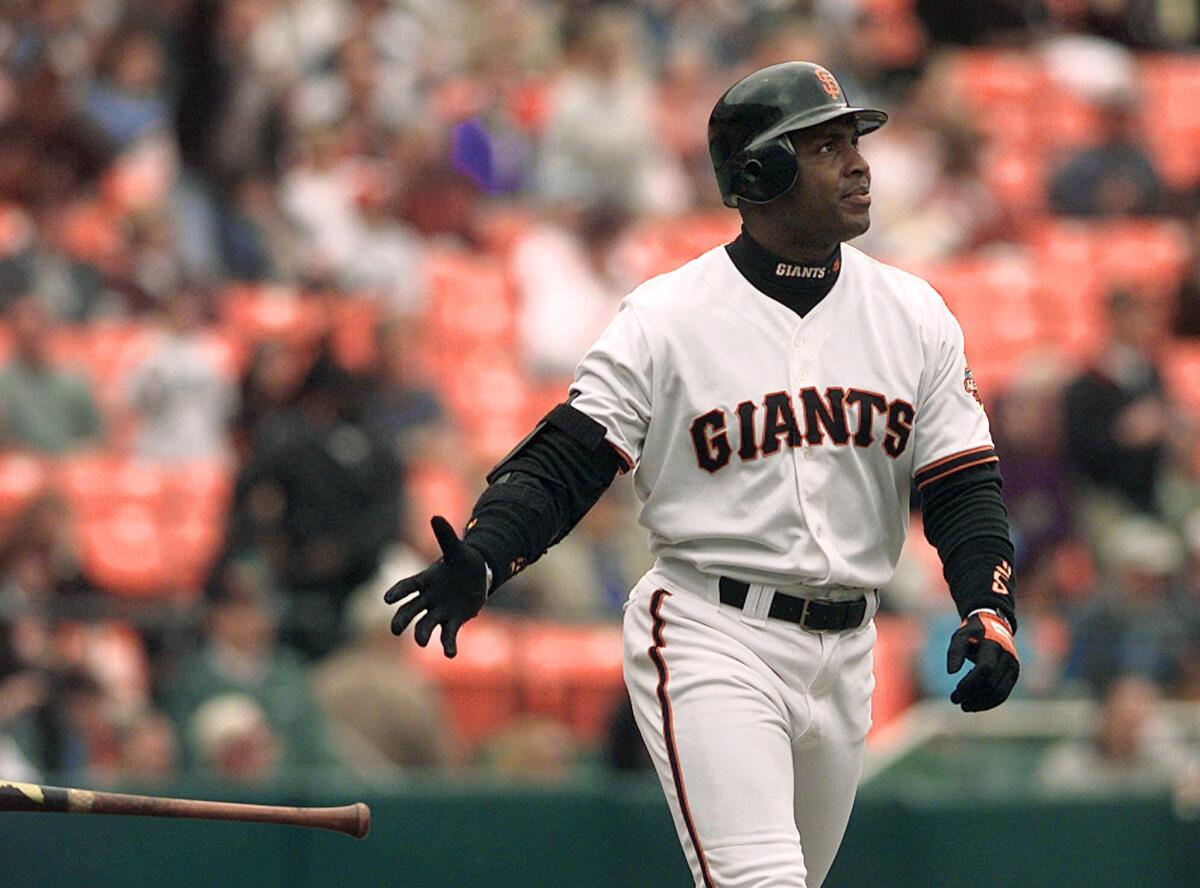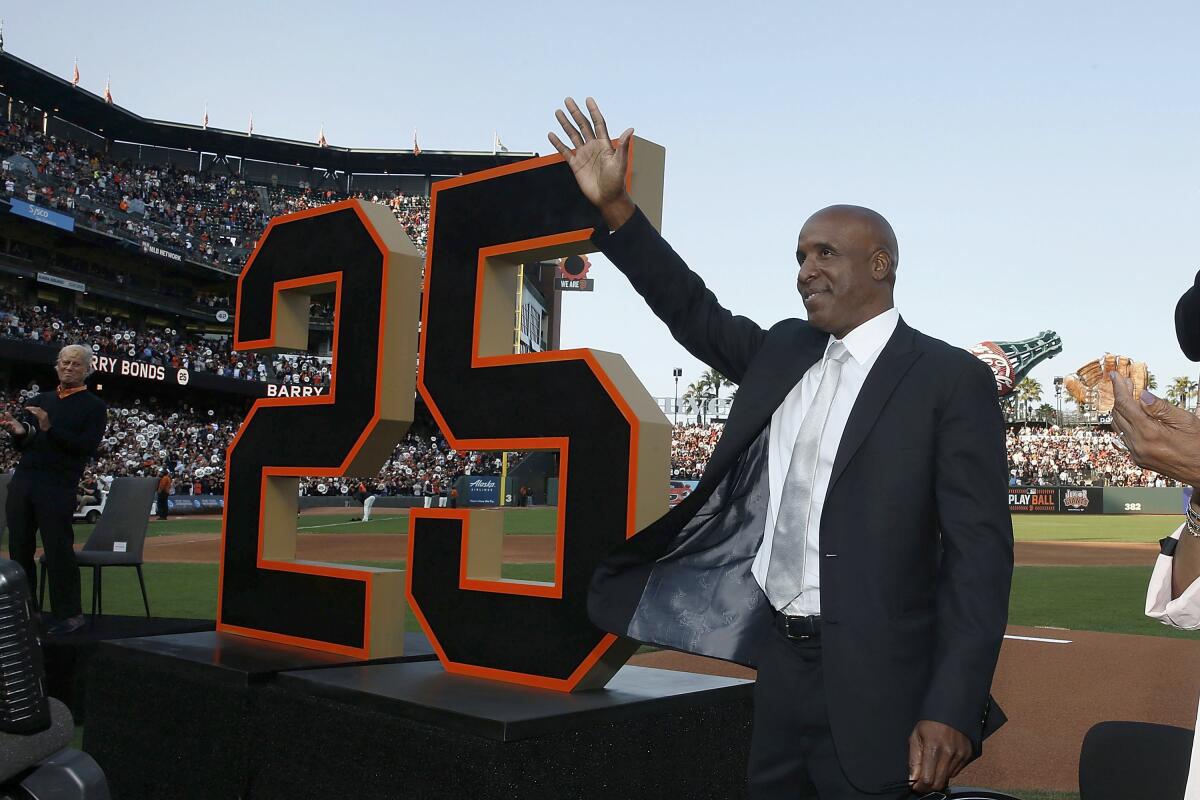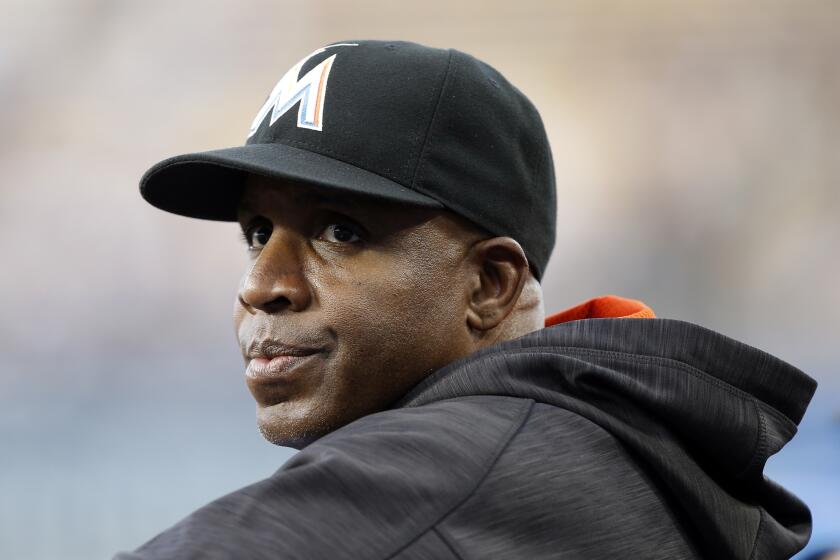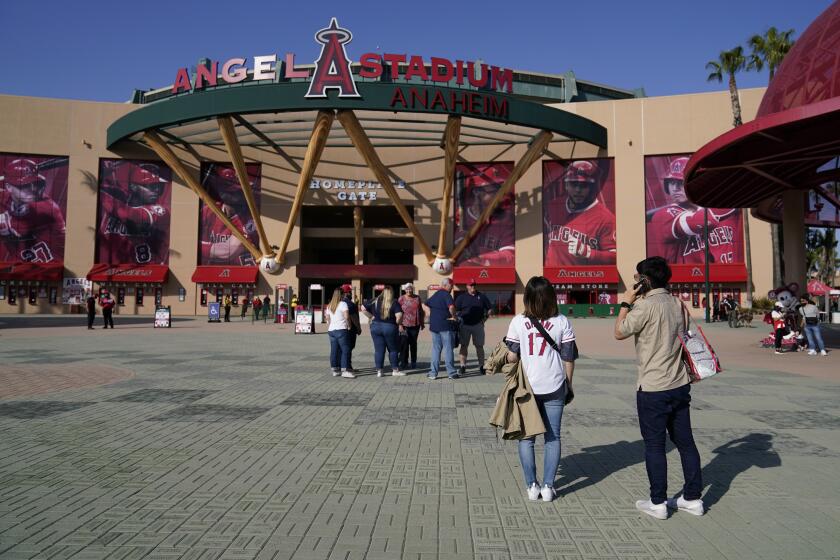Commentary: Barry Bonds didn’t make the Hall of Fame. Get over it.

- Share via
Neither his name nor his greatest accomplishment is hidden. On the official website of Major League Baseball, he is immortalized as owner of the sport’s most cherished record, atop the all-time home run list: Barry Bonds, 762.
There is no asterisk by his name, even though steroids enhanced his performance enough for him to squeak past the revered Hank Aaron, who hit 755 home runs.
The Miami Marlins employed Bonds as a hitting coach. The San Francisco Giants retired his number. He is not banished from the sport in any way.
So the baseball writers kept Bonds out of the Hall of Fame. Boo hoo.
On talent alone, Bonds would have been a near-unanimous pick in his first time on the ballot. Instead, on his 10th and final Baseball Writers Assn. of America ballot, Bonds got 66% of the vote, with 75% required for election. The only player elected Tuesday: David Ortiz, the Boston Red Sox icon.
The perception will be that a minority of baseball writers decided to sacrifice Bonds, depriving him of a plaque in Cooperstown, N.Y., so they could thump their chests and make a splashy statement about the steroid era.
The reality is more complex, as it always is. Accountability is an increasingly fleeting concept in this country. For this one day, baseball experienced accountability.
David Ortiz, who led Red Sox to three World Series titles, was the only 2022 candidate elected to the Baseball Hall of Fame. Barry Bonds and Roger Clemens fell short again.
Not from within, of course.
There was no shortage of commentary about how the Houston Astros’ tech-aided sign stealing was baseball’s biggest scandal since the steroid era. No players were held accountable. The fall guy was Jeff Luhnow, the Astros’ general manager.
International scouting operations are rife for cheating. The league has made some progress, but there was a relatively anonymous fall guy there too: John Coppolella, the Atlanta Braves’ general manager.
The steroid era did not even produce a fall guy within the sport.
Bud Selig, the commissioner at the time, is in the Hall of Fame — elected not by the writers, but by a committee of his peers. Alex Rodriguez got the longest ban of anyone suspended for steroids, and he subsequently was embraced as a national television commentator — a face of baseball, if you will.
Two decades later, it is easy to forget how brutal the steroid era and its aftermath were. Congress summoned baseball figures to nationally televised hearings, including All-Star testimony from Roger Clemens, Mark McGwire and Sammy Sosa. Selig testified too, under such pressure that he hired former U.S. Senator George Mitchell to get Congress off his back.
Mitchell delivered a 311-page report that was comprehensive and salacious all at once. He named names, dozens of them. He provided evidence: Paul Lo Duca thanking his supplier on official Dodgers letterhead; an address label from Eric Gagne’s supplier for delivery directly to “Dodger Stadium, c/o Eric Gagne — L.A. Dodgers — Home Clubhouse.”
The league, as Mitchell recommended, essentially opted for amnesty, looking toward the future and focusing on a meaningful drug testing program. “Spending more months, or even years, in contentious disciplinary proceedings will keep everyone mired in the past,” Mitchell wrote in his report.

That was 2007. This is 2022, and the league still has not truly reckoned with its past. The league punted the matter to the Hall of Fame, and in turn the Hall punted to the baseball writers.
The Hall of Fame ballot asks voters to consider “the player’s record, playing ability, integrity, sportsmanship, character, and contributions.” How should voters account for the steroid era? In that light, how should voters define integrity and character?
Hall of Fame board members shrugged, leaving it to each writer to decide, and many writers publicly explained how they settled on players from the steroid era. Some threw up their hands and considered nothing but statistics.
Some tried to assess careers solely before a player was suspected to have used steroids — weird, because the reason you would not vote for Bonds is because he used steroids, so you just wipe out the part of his career in which he did?
Some decided on a standard of proof — a failed drug test, for example. Some decided everyone must have been using steroids, disappointing mothers everywhere who told their kid just because all the other kids did something did not make it right.
Anaheim Mayor Harry Sidhu should be able to identify who doesn’t want the city’s Angel Stadium land deal with Arte Moreno to succeed, but he’s not talking.
The Times does not allow its writers to vote. If I had, I would have voted for Bonds. I believe the Hall of Fame should include the greatest player of every era, and Bonds is the greatest player of the steroid era.
But pay no attention to the wailing about how the Hall of Fame cannot tell baseball’s story without Bonds. The Cooperstown complex is called the National Baseball Hall of Fame and Museum. Bonds artifacts are displayed in the museum. Just because Bonds does not have a plaque does not mean his story goes untold in Cooperstown.
The writers diverged on Bonds because people diverge on Bonds. Good luck getting 75% of any group in this country to agree on anything even remotely controversial.
If Bonds had admitted to using steroids and apologized, would he have been elected? McGwire did, and he never got even 25% of the vote in his decade on the ballot.
Bonds does not care about your forgiveness. He does not seek it. He does not need a plaque to verify his greatness.
More to Read
Go beyond the scoreboard
Get the latest on L.A.'s teams in the daily Sports Report newsletter.
You may occasionally receive promotional content from the Los Angeles Times.













